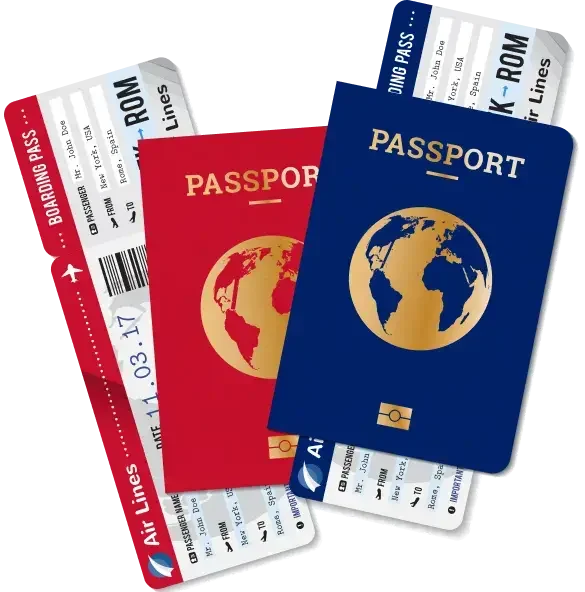Population
GDP (per capital)
Visa-Free Countries
GDP (purchasing power parity)
-
How to Immigrate to Serbia via Investment in 2025
-
Serbia is becoming an increasingly attractive destination for investors seeking European residency. With its strategic location, growing economy, and accessible investment opportunities, Serbia offers a unique pathway for those looking to secure residency through business or real estate investments. Unlike other European countries with high thresholds, Serbia provides a flexible and straightforward route, making it an appealing option for investors in 2025. In this article, we’ll explore how you can immigrate to Serbia via investment and what benefits this residency offers.
- Main Industries
- Agriculture and Food Processing
- Energy and Mining
- Tourism and Hospitality
- Machinery and Equipment Manufacturing
- Textile and Apparel
- Construction and Infrastructure
- Information and Communication Technology (ICT)

UTC+1
88,361 km2
Belgrade
Serbian dinar (RSD)
Serbian (official)
Hungarian, Albanian, Bosnian, Slovak, Romanian, Croatian, Ruthenian, Bulgarian, Vlach

Why Serbia?
Serbia is an attractive choice for investors, offering a strategic location, affordable living, and a growing economy. With a stable political climate and business-friendly environment, it provides opportunities for personal and professional growth. Its proximity to the EU and visa-free travel to many countries further enhance its appeal. Serbia’s accessible investment programs, especially in real estate and business, make it a top destination for international investors in 2025.
Benefits of Serbian Residency
Obtaining residency in Serbia offers several advantages that make it an appealing option for investors and their families. Whether you’re seeking access to essential services, expanding your business, or considering long-term settlement, Serbia provides numerous benefits for its residents.
- Access to Healthcare and Education: As a resident, you and your family can benefit from Serbia’s affordable, high-quality public healthcare and access to internationally recognized educational institutions.
- Business Growth Opportunities: Serbia’s strategic location, competitive tax rates, and business-friendly environment make it an ideal hub for expanding into the EU and broader markets.
- Pathway to Citizenship: Investors can transition from temporary to permanent residency, with the option to apply for Serbian citizenship, granting visa-free travel and other benefits.

-
Pathway to Citizenship
-
Securing Serbian citizenship is the ultimate goal for many investors who begin their journey with residency. After obtaining permanent residency, individuals can pursue naturalization, a process that opens the door to full legal rights and a wealth of opportunities.
-
Naturalization Process: After about five years of residency, permanent residents can apply for Serbian citizenship, requiring proof of residency, financial stability, and a clean criminal record. Applicants may need to demonstrate knowledge of the Serbian language and culture.
-
Timeframe and Requirements: Citizenship typically takes around five years from obtaining permanent residency, with a requirement to maintain residency and meet legal obligations.
-
Benefits of Citizenship: Serbian citizenship offers visa-free or visa-on-arrival access to many countries, the right to live and work in the EU’s Schengen Area, political rights, and the ability to pass citizenship to descendants.

Overview of Serbia’s Residency by Investment Program
Serbia offers a route to European residency through investment, without a direct citizenship-by-investment program. Investors can gain residency by purchasing real estate or starting a business, with the possibility of citizenship through naturalization. This affordable and flexible pathway allows progress toward permanent residency and Serbian citizenship, unlocking greater travel and business opportunities in Europe.
Investment Pathways to Residency
Serbia provides two primary avenues for securing residency through investment, both designed to attract a wide range of applicants by keeping entry barriers relatively low.
For investors considering a move to Serbia, there are two main pathways to residency, each offering flexibility, accessibility, and the chance to build a strong future in the heart of Europe.
- Real Estate Investment: Foreign nationals can obtain Serbian residency by purchasing residential or commercial real estate, with no minimum investment requirement. To maintain residency, the property must be held for about five years, ensuring legal status and gradual integration into the local community.
- Business Investment: Investors can also gain residency by starting a business in Serbia, with no strict minimum capital requirement. By registering a company and contributing to the economy, entrepreneurs can benefit from Serbia’s growing market and favorable tax rates, alongside meeting residency criteria.
Both options present practical, straightforward methods for obtaining residency, opening doors to long-term settlement and future citizenship possibilities.
Eligibility Criteria
To successfully obtain residency through investment in Serbia, applicants must meet the following requirements:
- Proof of Financial Stability: Applicants must show they have sufficient funds to support themselves and any dependents without relying on Serbian social services.
- Health Insurance Coverage: Valid private health insurance must be secured to ensure access to healthcare during the stay.
- Clean Criminal Record: A police clearance certificate from the applicant’s country of origin, and any other country of long-term residence, is required.
- Maintenance of Investment: Investors must retain ownership of their qualifying property or business for a set period, typically five years, to qualify for permanent residency.
- Self-Sufficiency: Applicants must demonstrate the ability to live independently without becoming a financial burden on the state.

Serbia Visa Application Process
Serbia Visa Application Process
Applying for residency in Serbia through investment is a structured yet straightforward process. By following a clear set of steps and preparing in advance, applicants can navigate it with ease and efficiency.
Step-by-Step Guide
- Choose Your Investment Path: Decide whether you will acquire real estate or establish a business in Serbia.
- Prepare Required Documentation: Gather essential documents such as a valid passport, proof of financial means, health insurance policy, a clean criminal record certificate, and documents related to your investment (property deed or company registration papers).
- Submit the Application: Lodge your residency application at the Serbian Ministry of Interior or through the local police office dealing with foreign nationals.
- Attend a Personal Interview: Applicants may be invited for an interview to verify the information provided and confirm the purpose of their stay.
- Await Decision: Residency approvals typically take between 30 to 60 days, though processing times can vary depending on the complexity of the case and document completeness.
- Receive Your Temporary Residence Permit: Once approved, you will receive a residence permit, usually valid for one year and renewable annually.
Tips for a Smooth Application:
- Work with a Local Legal Advisor: Hiring a lawyer experienced in immigration law can help avoid delays and ensure your paperwork is in perfect order.
- Ensure Accurate Translations: All foreign documents must be officially translated into Serbian and certified by a court translator.
- Stay Ahead of Renewal Deadlines: Temporary residence permits require timely renewals; it’s wise to start the extension process at least 30 days before expiry.
By approaching the application with thorough preparation and local guidance, investors can expect a smooth transition into life in Serbia.
residency by Real Estate Investment
residency by Real Estate Investment
Additional Costs
- Property Transfer Tax: 2.5% for secondary real estate.
- Notary Fees: For certifying the purchase contract.
- Document Translation: Certified translations of documents into Serbian.
- White Card Registration: Registration of your place of residence.
- State Duty: Application fee for the residence permit, typically between RSD 5,000 to 7,000 (€45–€70).
- Health Insurance: Valid coverage during your stay.
- Bank Account: Opening a personal bank account in Serbia.
- Agent Services: Optional, for assistance with property selection and legal procedures.
Initial Investment
- No official minimum investment requirement.
- Properties can be purchased for as little as €10,000, though investments around €20,000 are recommended to ensure a smooth process.
Annual Maintenance Costs
- Property Tax: 0.2%–1% of the cadastral value, depending on location and property specifics.
- Income Tax: 20% on rental income for non-resident landlords.
- Utility and Maintenance Fees: Variable based on property size and location.
Residency by Company Formation
Residency by Company Formation
Initial Costs
- Company Registration: Approximately €5,000, covering establishment and residency application.
- Registered Office: Annual fee starting at €3,600, including VAT and tax statements.
- Apartment Rental: Optional, for securing a Serbian address; annual fee of €3,600.
- White Card Registration: Registration of your place of residence.
- State Duty: Application fee for the residence permit, typically between RSD 5,000 to 7,000 (€45–€70).
- Health Insurance: Valid coverage during your stay.
- Bank Account: Opening a corporate bank account in Serbia.
- Agent Services: Optional, for assistance with company formation and legal procedures.
Annual Operational Costs
- Company Maintenance: Ongoing costs to keep the company active, including bookkeeping and tax filings.
- Apartment Rental: If applicable, the annual fee of €3,600.
Residency Permit Processing Time
- Processing Time: Typically, up to 30 days after submission of all required documents.
- Family Applications: Family members can apply simultaneously or subsequently, with processing times varying accordingly.
Challenges for Immigrating to Serbia via Investment
When considering residency in Serbia through investment, several factors require attention. While the process offers opportunities, it also presents potential obstacles. Here’s a concise look at the key considerations:
Bureaucratic Processes:
Serbia’s immigration procedures can be intricate. The documentation requirements are extensive, often involving notarization and translation of official papers. Approval times can vary, sometimes leading to delays if discrepancies arise. Dealing with multiple government agencies also adds complexity, so patience is crucial.
Legal Assistance:
Given Serbia’s unique legal landscape, securing local legal advice is highly beneficial. A lawyer can guide you through property transactions, ensure compliance with business regulations, and help with translation and notarization. Additionally, they can assist in understanding tax obligations and avoid potential legal pitfalls.
Due Diligenc:
Thorough research is essential before committing to any investment. Whether buying property or launching a business, understanding the market and local regulations is key. Consulting with local experts, such as real estate agents or accountants, can help mitigate risks and ensure that your investment aligns with your goals.
Local Laws and Regulations:
Serbia’s legal environment differs from that of many Western nations. Property laws, business regulations, and tax systems all require careful consideration. Foreign investors can purchase property, but there are restrictions, especially regarding agricultural land. Understanding these laws will prevent future challenges.
Language and Cultural Barriers
While English is common in larger cities, knowledge of Serbian can be vital for smoother interactions. For many official processes, hiring translators or bilingual professionals may be necessary to avoid misunderstandings.
Financial Considerations:
Serbia’s currency, the dinar (RSD), can fluctuate, affecting the cost of investments. Currency risk is something to account for, especially if you are dealing with large sums in foreign currency. Financial advice or hedging strategies could help safeguard your investment.
Final thoughts
In conclusion, immigrating to Serbia through investment presents a promising opportunity, but it requires careful planning and awareness of potential challenges. By navigating bureaucratic processes, seeking legal assistance, conducting thorough due diligence, and understanding local regulations, you can ensure a smooth and successful investment journey.
FAQ about Investment in Serbia
What are the main investment options for obtaining residency in Serbia?
You can invest in real estate or start a business. Real estate investments typically start at €20,000, and business formation involves company registration and additional costs.
Do I need legal assistance when applying for residency in Serbia?
While not required, it’s recommended to consult a local lawyer for help with legal processes, translations, and property transactions.
How long does the residency application process take?
It typically takes up to 30 days, but delays may occur depending on the complexity of your case.
Are there any restrictions on property purchases for foreign investors?
Foreign investors can buy property, but there are limits on agricultural land and property size (up to 2 hectares). Always check property legality before purchasing.
Looking for expert visa support?
PROGRAM MATCH
Compare the different programs in a nutshell and discover their features
PROGRAM COST
Check the cost estimates for each offered program
PROGRAM MAP
Explore the power of global mobility for every passport in the world
